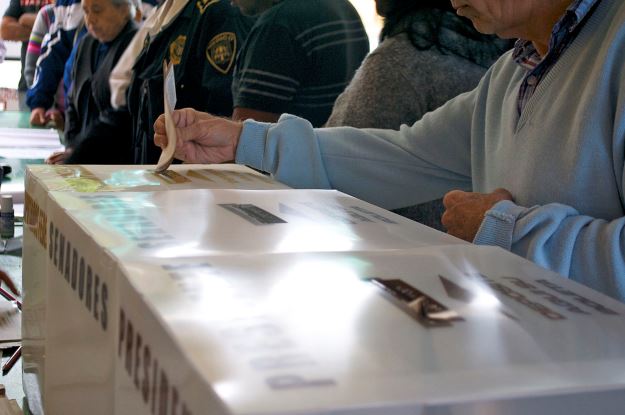Mexicans from the U.S. border to the Yucatan peninsula issued a strong rebuke to President Enrique Peña Nieto and his ruling Institutional Revolutionary Party (PRI) in state elections on Sunday. The PRI lost governorships in six of the nine states it held going into the vote, including four – Durango, Quintana Roo, Tamaulipas and Veracruz – where the party has ruled without interruption since the 1940s. The clear beneficiary was the National Action Party (PAN), which will govern eleven of Mexico’s thirty-one states after Sunday’s results, the most in its history.
The results are being billed as a harbinger of the 2018 presidential race, in which the PRI will likely struggle to hold on to power amid widespread dissatisfaction with its performance. But while the outcome undoubtedly reflects popular discontent with the PRI, the bigger story involves the increasing risks that unaccountable state governors pose to security, governance and economic development in Mexico.
Veracruz, a PRI bastion for over eight decades until Sunday, vividly demonstrates these dangers. During the administration of outgoing governor Javier Duarte, Mexico’s third-most populous state and a key hydrocarbons producer became synonymous with lawlessness and graft. Over $2 billion of federal funds for education, security, sewage and other services were diverted, disappeared, or otherwise went unaccounted for during his tenure. The governor allegedly stole an additional $35 million through public contracts awarded to shell companies affiliated with his associates, according to online investigative news source Animal Político. Meanwhile, the number of veracruzanos living in extreme poverty increased 22 percent under Duarte’s watch, the second-largest increase among Mexican states during this period.
Violent crime also skyrocketed, evidence of the increasing entrenchment of drug cartels in the geographically strategic state. While links between the state government and organized crime are difficult to prove, the participation of state police in the disappearance earlier this year of five students – whose bodies along with hundreds of others ended up on a ranch controlled by drug cartels – suggests the worst.
All this malfeasance was enabled by a lack of checks on executive power. Duarte’s allies in state Congress, where the PRI and its coalition partners held a majority, blocked attempts to investigate the government’s management of public resources, even as evidence of corruption mounted. Meanwhile, the state prosecutor, widely considered to be influenced by the executive, has dismissed 13 criminal complaints against state officials for lack of evidence, and the state’s head auditor is a former top PRI official.
Federal oversight is also problematic. Federal auditors have issued 34 criminal complaints against Veracruz officials and ex-officials for financial irregularities, leading the head of Mexico’s chief auditing body to suggest the governor should be behind bars. While most of these accusations are still under investigation by Mexico’s attorney general, the willingness of federal prosecutors to vigorously pursue politically sensitive cases has come under serious scrutiny.
Given this state of affairs, it is hardly surprising that voters finally showed the PRI the door. But the problem of corrupt, unaccountable and authoritarian governors is hardly unique to Veracruz, or to the PRI. PAN governors have been involved in their fair share of scandals, including some of the most egregious abuses of public authority. Most notoriously, the PRD’s links to the abduction and killing of 43 college students in 2014 outside Iguala in the state of Guerrero (where both the municipality and the state were governed by PRD members) led to a precipitous drop in the party’s support.
In light of this recent history, it is hard to muster much confidence that results from last Sunday’s elections will help resolve the intractable challenges facing many states. Citizens have few channels to oversee or even monitor a governor’s actions. Institutions of horizontal accountability at the state level – the local congress, courts, government auditors – tend to be subordinate to the governor, who often appoints key judiciary and electoral officials. Local media are constrained by both attacks on journalists and reliance on government advertising. Protesters are often ignored. To complete the picture, a steady flow of federal transfers into state coffers frees governors from relying on local tax revenues, breaking a critical link of accountability to voters.
As a consequence, governors can run their states as personal fiefdoms if they are so inclined. They can lord over legislatures, place compadres in positions of power, borrow vast sums of money with little oversight, and shell out lucrative contracts to friends and family. Not surprisingly, this combination of opportunism and unchecked power makes links to organized crime all too common.
Still, there are signs that politicians are finally getting the message. The winning candidates in Veracruz as well as border state Chihuahua both made investigating corruption in the outgoing administrations a central part of their campaigns. Seeing a few high-level officials behind bars would certainly put a dent in the culture of impunity. More important still is a package of anti-corruption reforms, initially proposed by the Peña administration in 2012, whose implementing legislation has been repeatedly delayed and watered down by PRI lawmakers.
After its poor performance Sunday, the PRI might finally find the political will to put in place serious anti-corruption measures – which would include a citizen initiative requiring all public officials to declare assets, tax returns and potential conflicts of interest. In addition, party leaders, who have ultimate responsibility for the candidates they put forth, need to exercise better oversight over selection processes.
In the end, parties’ own electoral self-interest may provide the best motivation for much-needed and long-overdue reforms.
—
Kahn is a Ph.D. candidate at the Johns Hopkins School of Advanced International Studies (SAIS) in Washington DC.









